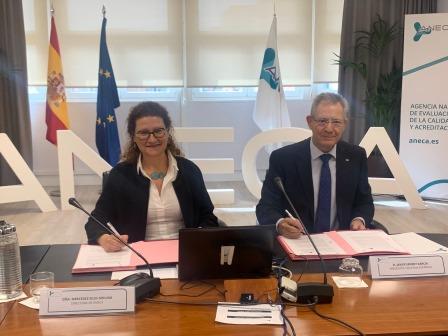ANECA and Red Cross collaborate to improve the inclusion of vulnerable students in universities
-
19/10/2022
The director of the Agency, Mercedes Siles Molina, and the president of the Red Cross, Javier Senent García, signed a collaboration agreement today.

The National Agency for Quality Assessment and Accreditation (ANECA) and the Red Cross have signed today at the Agency's headquarters an agreement for collaboration in the development of actions, proposals and programmes aimed at improving the inclusion of groups in vulnerable situations in the Spanish university system, as a hallmark of our universities’ quality and excellence.
In this way, inclusive universities are promoted in line with the Sustainable Development Goals (SDGs), especially Goal 4, which aims to ensure inclusive, equitable and quality education and promote lifelong learning opportunities for all.
Special attention will be paid to the priority groups aided by the Spanish Red Cross: migrants, refugees, those in situations of extreme vulnerability, women in social difficulty, people affected by health problems, the unemployed, young people in social difficulty, as well as other groups that may have difficulties of access due to their situation of vulnerability.
ANECA and the Red Cross may collaborate jointly, within their sphere of competence, in the development of the following lines of action:
- Awareness-raising and training to help eliminate any prejudice that hinders the right and opportunity for people in vulnerable situations to access university.
- Proposal for inclusion indicators, which allow the degree of inclusion of the Spanish university system to be assessed. To this end, the Red Cross may collaborate in ANECA projects in this regard, such as the report on the state of the external quality assessment of Spanish universities, the measurement of the impact of the actions of universities in terms of inclusion of groups in vulnerable situations, as well as other reports and work aimed at these objectives.
- Inclusion of specific criteria in the six-year transfer period that value those actions that generate social value.
- Comprehensive Quality Recognitions Red Cross experts will participate in ANECA's technical committees for the design and methodology of the quality itineraries of the Higher Knowledge Space that connect Institutional Accreditation with the Comprehensive Quality Recognitions granted by ANECA in the field of the SDGs.
Present for the signing of the agreement were, from ANECA:
- Mercedes Siles Molina, director.
- José Ángel Domínguez Pérez, president of the Internationalisation Committee.
- Ana Hidalgo, head of the National Commission for the Evaluation of Research Activity.
- Esther Balboa, head of the Quality and Foresight Unit.
From the Red Cross, the following attended:
- Javier Senent Garcia, president.
- Rafael Gandía Balaguer, regional president in the Valencian Community.
- Pablo Navajo, director of the knowledge area of Education.
The Agency's director, Mercedes Siles Molina, said: "There is a human part of our society that is weaker, and that weakness we have an obligation to protect and strengthen through our actions. She also asserted that "this agreement is a milestone in addressing the challenges of inclusion that our society demands of us".
The president of the Red Cross, Javier Senent García, highlighted: "We are an organisation of society for society" from which "alliances are created at the social level in any field". "Studies are essential for people to integrate into society," he added.
